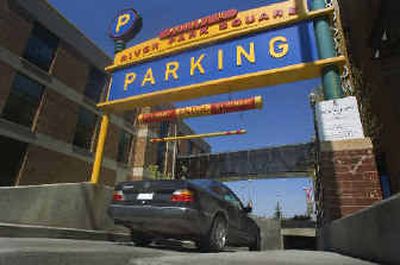City may settle RPS dispute

The city of Spokane and its former legal advisers tentatively agreed to a $4.25 million settlement to end the federal trial over the River Park Square garage.
The City Council will be asked to vote this afternoon on a proposed settlement with former bond counsel Roy Koegen and his former law firm, Perkins Coie. If a majority of the council says yes, the legal malpractice trial under way in Richland will end.
“It allows the city to get out of the past and get our focus where it needs to be,” said Gavin Cooley, the city’s chief financial officer.
City Councilman Al French, who has been involved in some settlement discussions over the garage dispute, said the agreement will save legal costs for the remaining four weeks of a trial. “It’s good to have it done and put to bed,” French said.
But Councilwoman Cherie Rodgers, a longstanding critic of the garage deal, said she would vote against the settlement as part of her ongoing opposition to the city’s legal strategy. Rodgers said she never agreed with the city’s decision to file the malpractice claim against Koegen and Perkins Coie and didn’t think the city would have won a cash award from the jury.
“They were headed for a whoopin’,” she predicted.
U.S. District Judge Edward Shea gave the nine-member jury two days off without telling them why. If the council agrees to the settlement, the jury will be dismissed and the trial will be over. If not, it can resume as early as Thursday morning.
The settlement payment, which would come from Perkins Coie’s insurance carrier, would be added to the other settlements the city has negotiated over the last year, since it reimbursed the investors who owned bonds backed by revenues from the financially strapped garage.
That would leave about $20 million for the city to cover. It will sell bonds backed by the city’s general fund, but the principal and interest payments on the bonds should be about the same as what the city receives in parking meter revenues, Cooley said.
After borrowing some $32.6 million to buy out the bondholders, the city has spent the last year negotiating settlements with its former co-defendants. Each time a deadline for the trial neared, one or more defendants would negotiate terms, and the trial would be postponed.
By the time the trial started last Thursday, the case was reduced to the city’s malpractice claim, essentially that it got bad legal advice from Koegen, its longtime bond counsel.
“We’ve been having discussions for the last several weeks,” Mayor Jim West said in a phone interview from Washington, D.C. “We wanted not to go to trial, either side.”
But the two sides were far apart in what the law firm was offering and the city was willing to accept, French said. A jury was selected last Thursday, and attorneys began arguing a case that could have put all the participants in the mall controversy on the stand.
Laurel Siddoway, a private attorney hired by the city to handle River Park Square litigation, told jurors that the city and the other participants in the mall renovation did deceive bondholders by not telling them the truth about the garage and its financial prospects. Had Koegen and his former law firm done their jobs, the bonds wouldn’t have been sold and the lawsuit never filed.
Ralph Cromwell, an attorney for Koegen and Perkins Coie, said the city was trying to blame the attorney and his former firm because it didn’t like the way a business deal turned out even though it got the revitalized downtown it sought in the beginning. Koegen had even advised city officials not to make some of the choices that later caused them problems, Cromwell noted.
That has been one of the problems with the city’s legal strategy all along, Rodgers contended Tuesday.
“To me, they didn’t have a malpractice case. Roy didn’t make them do it,” she said.
The mall renovation was proposed in the mid-1990s as a way to shore up a declining downtown retail district by building a new Nordstrom store, expanding a 20-year-old mall, adding a multiplex theater and enlarging the existing garage. The city agreed to several financing arrangements to help the mall’s owner, the development affiliates of Cowles Publishing Co., which also owns The Spokesman-Review.
A nonprofit foundation sold bonds backed by the expanded garage’s projected revenues and bought the expanded parking facility from the mall developer for $26.5 million. The city set up a development authority to oversee garage operation and was to receive the garage when the bonds were paid off; in return, it passed an ordinance promising to loan money from its parking meter fund to cover certain expenses if garage revenues were too low.
After the garage opened, revenues were so poor that some months it struggled just to cover bond payments. The city refused to loan the money that might never be repaid, and a cascade of lawsuits started.
French said the City Council of the mid-1990s bears some responsibility for the way the original deal was structured. “They allowed the desire to do the deal to let the snowball start rolling,” he said. The problem grew when a later council refused the loan, “escalating the speed of the snowball,” French added.
West said he didn’t want to play Monday morning quarterback on the decisions of his predecessors.
“This issue has plagued our community for far too long,” West said. “It doesn’t matter how it happened, other than to make sure it doesn’t happen again.”
The city might still appeal one of Shea’s decisions that allowed Prudential Securities, the underwriter of the garage bonds, to get out of the lawsuit without paying anything, West added.